McGill newsmakers 2002
If you can believe the newspapers, last year dealt a terrible setback to the folks at one of our sister universities.
"This will be a devastating blow to the students of Queen's University," Mike Lindsay, president of the school's Alma Mater Society, sombrely informed the National Post.
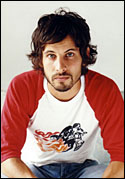 Sam Roberts
Sam Roberts Katie Holmes in Abandon
Katie Holmes in Abandon |
|
Had a fire wiped out half the campus? Had a beloved provost been abducted by aliens?
No.
McGill, the Kingston-based university's longtime rival, had been labelled "the Harvard of Canada" by not one, but two popular college guidebooks in the U.S.
The Princeton Review's The Best 345 Colleges touted the diversity of McGill's student population, the most international crowd of its kind in Canada. It also gave high marks to the "laidback, sexy" charms of Montreal.
McGill was selected one of the 12 "hottest" universities in North America by How to Get Into College, a guidebook published by Newsweek and Kaplan Educational Centers. McGill is "as tough as it comes in Canadian higher education," and its professors are "hugely entertaining," said the publication.
An even more discriminating bunch than guidebook editors also gave the university the thumbs up last year.
The nitpicky number crunchers at North America's two most influential bond raters —Standard & Poor's Rating Service and Moody's Investor Service -- took a close, hard look at McGill's academic accomplishments, as well as its financial management.
The university had set out to raise $200 million through unsecured debentures to finance new student residences and other projects. The bond raters' assessments would play a crucial role in determining the success of the plan. A poor rating and investors would likely hold their noses and walk away from the offering.
The rating agencies liked us. They really, really liked us. McGill received higher ratings from them than the Quebec government did and the university's debentures were quickly oversubscribed by $50 million.
Education student Kim St-Pierre's remarkable goaltending feats gave Canadians from coast to coast cause to celebrate in February when the McGill Martlets star led the national women's hockey team to a gold medal at the Salt Lake City Olympics in a game against the U.S. that was viewed by millions of people on TV.
A different McGill individual played a supporting role in what proved to be the biggest story of the Olympics.
Dr. Robert Foxford, an ER specialist at the McGill University Health Centre, served as Team Canada's chief medical officer in Salt Lake City. At one point, Foxford encountered the nervous-looking skating duo of Jamie Salé and David Pelletier. Their equipment was locked in a dressing room, the bus taking them to their competition was leaving in a few minutes and nobody could find the right key.
The quick-thinking Foxford took a crowbar to the door and helped pave the way for the duo's eventual gold medal.
"As I was doing it, I was thinking: 'This isn't my job,'" Foxford told the Canadian Press. "Number two, 'Jeez, this is kind of fun.' And number three, 'I think I'm going to get in trouble for this.'"
On another Olympic note, the cows of Macdonald Campus starred in a popular and frequently aired TV ad for the Dairy Farmers of Canada during the Games. The cows starred as figure skating judges -- given the controversy that ended up surrounding the judging process at the Games, the cows might have actually done a better job than the real McCoys.
The commercial's creators "needed cows that were clean, good looking and fully relaxed," explained Professor Suzelle Barrington, director of the Macdonald Campus Farm's dairy unit. "They didn't want cows that would be running all over the place during shooting. Our cows were quiet and well behaved" when the ad's production team arrived for a visit.
The well-casted cattle weren't the only ones at McGill to take a star turn in 2002. The university itself was showcased across North America in the Hollywood film, Abandon, shot, in large part, on campus.
When the film was released, McGill students, many of whom worked as extras on the flick, turned out in droves to see if they appeared on screen in any scenes with stars Katie Holmes or Benjamin Bratt.
While the movie itself drew only middling reviews, McGill earned top marks from the movie's production team for its starring role.
"The filmmakers wanted a location that had an old New England, Victorian architectural style," said location manager Celine Daignault. "They also wanted a place that had ominous tunnels, which play a key role in the film." Stately and spooky, that's McGill for you.
Not to mention, sharply dressed. "Maybe it's the European influence, but the student body is incredibly stylish," posited Abandon director Stephen Gaghan.
McGill edged its way back up into third place in the annual Maclean's rankings of Canada's medical/doctoral universities. McGill led every university in the country in two crucial categories. McGill students win more national awards than their counterparts at other schools. Ditto for McGill's professors.
Seven McGill law students were named as Supreme Court clerks, a total that topped every other law school in the nation. One hundred and thirty-two McGill students earned Royal Bank Academic All-Canadian honours, marking their status as athletic standouts and stellar classroom achievers. Our student-athletes established a new national record for the most All-Canadians at any one university in a single year.
Perhaps the most eye-catching award earned by a McGill professor went to classics scholar Anne Carson last year.
She earned the T.S. Eliot Prize for poetry, one of the world's most prestigious literary awards. Carson won the prize for The Beauty of the Husband: A Fictional Essay in 29 Tangos, a poignant reflection on marriage and divorce. Her latest book, an English translation of the works of Sappho, was recently named one of 2002's best books by The Economist.
Carson was far from the only McGill professor to attract the attention of the world's media last year.
For the last few years, the Reporter has used media databases and Internet news search engines to determine which McGill research stories received the most coverage in the year just completed.
We don't catch every single mention of McGill in the news. But we do examine several hundred news stories that mentioned McGill which appeared in publications and on TV and radio shows and news websites around the world.
In compiling our annual list of the most popular stories, we don't count which professors were mentioned the most often, but rather which stories were deemed newsworthy by the most editors working for different media. For instance, Margaret Somerville's views on medical ethics cropped up nine times in the National Post last year. For this exercise, the newspaper's coverage of Somerville would only count once.
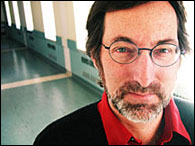 Jean-Pierre Julien
Jean-Pierre JulienPHOTOS: Claudio Calligaris |
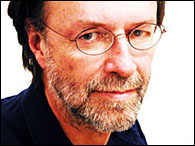 Ronald Barr
Ronald Barr |
1
Top spot this year goes to pediatrics professor Ronald Barr from the McGill University Health Centre.
Barr is one of the world's most respected experts on colicky babies. A recent study he co-authored concluded that the intense, inconsolable crying associated with colic might not indicate that anything is wrong with the infant in question. On average, colicky babies, even while they were wailing, had similar heart rates and similar levels of the stress hormone cortisol as babies who weren't colicky at all.
In other words, colicky kids didn't seem to be experiencing any more pain or discomfort than their quieter confreres.
Barr recognizes this knowledge offers only partial comfort to weary parents contending with a screaming baby at four in the morning.
"These are all things that piss parents off," Barr told The Globe and Mail. "But we hope that if parents understand this behavior is normal, they will be better able to cope with it."
Barr will be calling the University of British Columbia his home base from now on. He began a new job at UBC earlier this month.
His work on colic was covered by 49 different news media, including Canada AM, The Washington Post and The Boston Globe.
2
In second spot is another scholar who earned the media's attention with her research on babies -- Siobhan Holowka, a graduate student in the Department of Psychology.
Working with her supervisor, Laura-Ann Petitto, a former McGill psychology professor now headquartered at Dartmouth University, Holowka carefully observed very young children in the process of babbling, and she and Petitto detected that the kids generally used the right sides of their mouths much more while they babbled. When they made more random sounds, the children used both sides of their mouths equally.
Since the left side of the brain is thought to control language (and also controls the right side of our bodies) Petitto believes their finding indicates that babbling is a "fundamentally linguistic activity." Babbling is a prelude to more sophisticated forms of communication.
"If in babbling, the child were just working through mastering the motor output of the mouth, then all sounds should come out equally. But babbling was different. The findings support the idea that the brain has tissue dedicated specifically to learning language," Petitto explained to The New York Times.
The research was covered in 45 different news media, including Scientific American, The Daily Telegraph in Britain and CBC Radio's Quirks and Quarks.
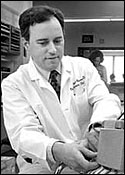 Renzo Cecere
Renzo Cecere Dave Williams
Dave Williams |
|
3
Third place was taken by Professor Margaret Somerville from the McGill Centre for Medicine, Ethics and Law. Somerville is especially popular with the media for her ability to offer thoughtful comments on complicated ethical conundrums, often at the drop of a hat. That's one reason why she appears on this list, year in, year out.
Another reason relates to the topical terrain she explores. Cloning. Xenotransplantation. Euthanasia. Her principal concerns relate to how a combination of ever-advancing scientific breakthroughs and changing social attitudes may be having a corrosive impact on how we regard human dignity and the sanctity of human life.
In an interview with The Globe and Mail about whether scientists should be allowed to use human embryos for stem cell studies, for instance, Somerville addressed her problems with such research.
"Does the embryo deserve the same respect as the rest of us? I think it does. I'm very, very concerned. . . that in a secular society, we don't lose our sense of the profound respect for the transmission of life, the essence of life, and for life itself."
Somerville's work in this area was explored by 35 different news media last year, including CBC Radio's Ideas, The Australian and Le Devoir.
4
Fourth spot was occupied by surgery professor Renzo Cecere and his team at the McGill University Health Centre's (MUHC) Royal Victoria Hospital.
Cecere and his colleagues performed two remarkable heart operations last year. In one, the first of its kind in Canada, a patient was fitted with a permanent heart pump. For some patients with failing hearts, a heart transplant is not an option because they have diabetes or other complications which make the procedure impossible.
Cecere said the pump could benefit 4,000 Canadians a year who suffer heart failure. "This is a potential revolution in the management of end-stage heart failure," he told The Medical Post.
The other surgery involved installing a temporary heart pump inside a two-year-old boy desperately awaiting a heart transplant. Again, it was the first time such a surgery had been done in this country and only the second time it had been performed in North America.
Cecere's groundbreaking work was chronicled in 31 different news media, including CBC TV's The National, The Toronto Star and the National Post.
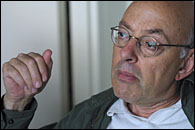 Henry Mintzberg
Henry MintzbergPHOTOS: Owen Egan |
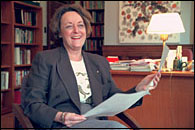 Margaret Somerville
Margaret Somerville |
5
Last year, of course, was the year of Enron, WorldCom and other sleaze-riddled business catastrophes. The fellow many reporters wanted to talk to about this phenomenon was management professor Henry Mintzberg, a man syndicated journalist Des Dearlove calls "the great debunker of corporate life."
A longtime critic of insanely high CEO salaries and of business practices that eschew common sense and good service in favour of flashy fads and questionable ethics, Mintzberg told Dearlove that "The system is sick right down to its roots. The obsession with narrow performance and economics skews the way that people act and think. Business can't function without some degree of social responsibility."
Mintzberg was in fifth place, with mentions in 30 separate news media, including BusinessWeek, The Times of London and The Economist.
6
Sixth place goes to human genetics professor Guy Rouleau and his collaborators at the MUHC.
Rouleau and his team discovered a gene that seems to play an important role in triggering juvenile myoclonic epilepsy (JME), a form of epilepsy that typically begins in early adolescence.
Rouleau's team uncovered a connection between JME and a mutation in the alpha 1 subunit of the GABAA receptor. "The GABAA receptor is important for controlling the electrical activity in the brain," Rouleau explained to the MUHC Ensemble. "We determined that the mutation affects the function of the GABAA receptor which results in abnormal electrical patterns."
Rouleau's work on JME drew attention from 28 different news media, including BBC News, La Presse and The Sunday Times of Australia.
7
Seventh spot goes to doctoral candidate Beatriz Ilari, who collaborated with communication sciences and disorders professor Linda Polka. The pair examined babies' ability to remember and react to complex classical music even after a two-week delay.
Wee ones in the study listened to Ravel three times a day for a 10 day period. After two weeks, they were brought to a sound lab to listen to various bits of music, including the Ravel.
Babies listened 20-30 percent longer to the music piece they had heard at home, compared to an unfamiliar piece. Babies in a control group which had not had the same exposure to Ravel showed no preference for any of the pieces they listened to.
"We have this idea that babies are maybe poor listeners, but in fact, they're not," Ilari told CNN.
Ilari's research was reported on by 20 different news media, including The Ottawa Citizen, the National Post and the TV show, Good Day Sacramento.
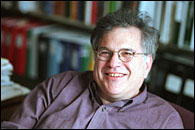 Jeffrey Derevensky
Jeffrey DerevenskyPHOTOS: Owen Egan |
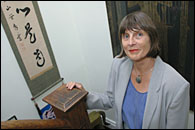 Margaret Lock
Margaret Lock |
8
In eighth position is Professor Jean-Pierre Julien from the MUHC's Centre for Research in Neuroscience.
Julien and his team found that minocycline, an antibiotic commonly prescribed for acne, delays the onset and progression of ALS, a debilitating and fatal brain condition also known as Lou Gehrig's Disease.
One of the problems associated with ALS is swelling in the brain. Minocycline has anti-inflammatory properties. ALS mice that were fed minocycline lived longer and didn't experience neuronal or muscle deterioration as quickly as ALS mice that didn't receive the drug.
Julien told the Reporter that he hopes minocycline might become part of a drug "cocktail" that targets different aspects of the disease, which typically affects people over the age of 45.
"If you're talking about someone who's 65 years old, and you extend their lifespan by 20 years, then you've beat it."
The story was covered by 19 different news media, including CBC TV's Canada Now, The Globe and Mail and The Toronto Star.
8
Tied for eighth position was anthropology and social studies of medicine professor Margaret Lock. Lock's recent book, Twice Dead: Organ Transplants and the Reinvention of Death, examined the concept of brain death. She contrasts the way in which brain death is perceived in North America with the very different view it receives in Japan. Brain death is not so much a medical certainty as a social convention that has evolved over time. Lock suggests that it is a subject that might require re-examination. In Japan, the question of whether or not brain death is equivalent to an individual's final passing has invited heated debate.
In North America, "We feel so strongly that death is just a matter of biology. And we also feel strongly that it's something that can be measured in the body, one way or another," Lock told The Chronicle of Higher Education. But when doctors decide that someone whose heart is still beating is dead, they enter "the whole social and cultural sphere."
Lock's work was mentioned in 19 different news media, including Maclean's, The New York Times and Britain's The Guardian.
10
In tenth spot is a familiar name: Guy Rouleau.
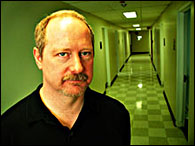 Guy Rouleau
Guy RouleauPHOTO: Claudio Calligaris |
|
Dr. Rouleau enjoyed an awfully productive year, publishing not one, but two studies last year that captured the attention of the media.
His MUHC team identified a mutant gene that triggers Andermann's Syndrome, a disease that leaves about 300 children a year, most of them living in Quebec's Lac-St-Jean and Charlevoix regions, confined to wheelchairs.
The discovery will allow potential carriers of the disease to be tested to help prevent its spread.
The story was covered by 17 different news media, including The Toronto Star, Le Soleil and CBC News.
10
Tied for tenth place is educational and counselling psychology professor Jeffrey Dereven-sky. Derevensky is the director of the McGill University Youth Gambling Research and Treatment Clinic. He examines the troubling growth of gambling among teens and looks at the reasons why this phenomenon is becoming more prevalent.
He assigns part of the blame to government-run lotteries.
"On the one hand, grownups say you need to work hard, gain an education and get a job. On the other, government-sponsored lottery corporations sell the dream of a quick bit of luck helping avoid a lifetime of labour," Derevensky told Canadian Press.
His work was chronicled by 17 different news media, including The San Diego Union-Tribune, The Calgary Herald and Radio National's Life Matters in Australia.
The year was not without its controversies and academic donnybrooks. One of the most noteworthy kerfuffles on campus last year pitted Professors Margaret Somerville and Katherine Young from the McGill Centre for Medicine, Ethics and Law against Professors Shari Brotman and Bill Ryan from the School of Social Work.
At issue was Somerville and Young's willingness to serve as expert witnesses for the federal government in its legal opposition to same-sex marriage.
The student group Project Interaction, supported in large part by Brotman and Ryan, organized classroom disruptions targeting Somerville and Young, and organized a large-scale mailing campaign critical of the pair.
Ryan told the CAUT Bulletin "our university was being used to sustain discriminatory laws." For their part, Somerville and Young felt they were being harassed for holding a legitimate point of view.
"Academic freedom should encompass... freedom to participate in the judicial process. Project Interaction's conduct toward us threatened these freedoms," Somerville and Young wrote in The Globe and Mail.
"At what point would such actions amount to... intimidation of a witness under the Criminal Code? We should be doubly concerned when threats to academic freedom are coming from within the academy itself."
Responding in the same newspaper a few days later, Brotman and Ryan wrote, "With the right to speak and be heard comes accountability; not only for the fact that we speak but, more importantly, for what we say. When academics support discriminatory positions in the political domain, those opposed have an obligation to speak out."
The university's donors established a new McGill record for private giving in a single year -- $67,212,423. McGill is quite choosy in the gifts it accepts, though. Donations need to be a good fit with the university's academic priorities.
Case in point: One gift, worth over $1 million, was politely declined because the university wasn't interested in establishing an endowed chair devoted to the philosophical musings of Atlas Shrugged author Ayn Rand, a champion of "rational selfishness."
"It's not the first or last time it's going to happen," Principal Bernard Shapiro said of McGill's decision to turn down the donation. A chair devoted to the study of Rand "would be too temporal and restrictive in scope," he told The Chronicle of Higher Education. McGill tried, unsuccessfully, to persuade the donor to support a chair in contemporary philosophy instead.
Rand devotees were enraged by the university's decision, flooding McGill administrative offices with angry phone calls for a few days.
McGill graduates also received plenty of attention in 2002 in stories that ranged from the sweet (fighter pilot Captain Desmond Brophy was selected as one of the three official escort pilots assigned to make sure that Santa enjoyed a safe journey across Canada on Christmas Eve) to the scary (engineer Maher Arar, a Canadian citizen, was deported to Syria by the U.S. because of unspecified concerns about his possible connections to terrorists. Arar's friends and family dispute the U.S.'s allegations about him, Canada has officially protested the action and Amnesty International has taken up Arar's cause).
The McGill graduate mentioned most often in the media (in stories that also noted her connection to the university) was new Supreme Court judge Marie Deschamps.
Other graduates that were popular with the press included Canadian Defence Minister John McCallum, NDP leadership hopeful Jack Layton, astronaut Dave Williams, Hollywood producer/writer John Rogers, rising young pop star Sam Roberts and, of course, Star Trek's William Shatner.

